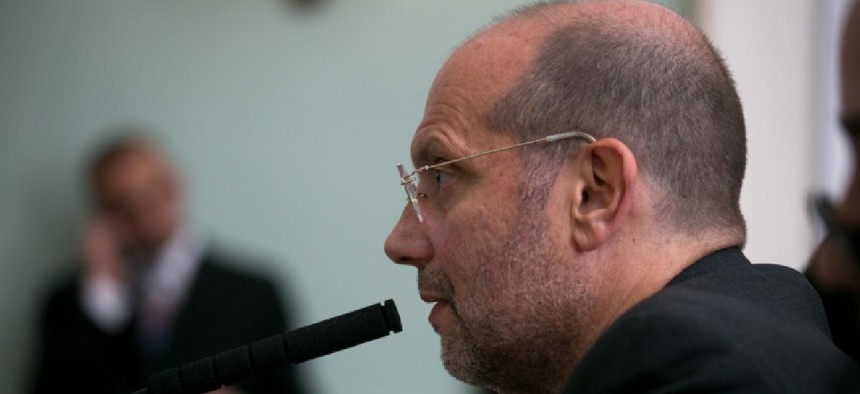Homelessness takes center stage at NYC budget hearing
What results does the New York City Department of Homeless Services have to show from a $1.75 billion increase in spending since 2014?

Commissioner Steve Banks William Alatriste/New York City Council
When New York City Human Resources Administration/Department of Social Services Commissioner Steven Banks concluded his testimony at a May 15 City Council budget hearing, City Councilman Stephen Levin had one overarching question to ask him:
What results did the city Department of Homeless Services have to show from a $1.75 billion increase in spending since 2014?
Banks pointed out that for the first year in a decade, the city homeless shelter population had held steady instead of rising. New funding this year would help increase services and data collection. And an ambitious program of shelter building was just beginning to replace the notorious “cluster site” shelters that housed homeless families in private apartments.
"Those are very concrete results in terms of the investment,” Banks said.
But Banks found himself having to defend his agency’s results during the budget hearing held to discuss funding levels in the latest proposed executive budget. Banks hopes to receive additional funding in the final budget in order to meet the needs of the approximately 60,000 individuals using homeless shelters in the city each night, and to support a variety of other proposals to boost social services in the city.
In his testimony, Banks noted that to combat stubbornly high levels of homelessness, the city had invested in a broad range of initiatives to expand the safety net for low-income New Yorkers at a time of decreased support at the federal level. Some of these initiatives included offering legal assistance to people in housing court, more support for people living with HIV, additional beds for domestic violence shelters and making a municipal commitment to develop 15,000 new units of supportive housing over 15 years.
However, a recent investigation by NYN Media into the use of hotels to house homeless families prompted concerns. The level of services, if any, provided to clients by one relatively obscure nonprofit contractor which had received $369 million in funding, was still unclear. Banks sidestepped questions regarding the nonprofit contractor, Childrens Community Services. Levin told NYN Media he would discuss concerns about the provision of services in an upcoming meeting with the nonprofit.
The city is on the verge of taming record homelessness that was caused by the policies of prior administrations, said Banks, echoing recent remarks from de Blasio. But in the meantime, despite their higher costs and fewer services, city hotels would continue to be used at increasing rates, Banks said.
“Our investments are beginning to take hold and are showing signs of progress,” Banks said in his testimony. “But we know that the transformation of these programs and services will not occur overnight and that we continue to have much more work to do to address the problems that built up over many years.”
Yet even as Banks continued to work to assuage Levin’s concerns, more bad news arrived. A new report from New York City Comptroller Scott Stringer added the Department of Homeless Services to an “Agency Watchlist” for concerns about “rapidly increased spending and insufficient measurable results.”
David Hansell, commissioner of the Administration for Children’s Services, also gave testimony before the council, and highlighted the city’s progress with implementing Raise the Age legislation and reforming the foster care system.
Hansell mentioned lingering challenges faced by the Administration for Children’s Services as the city rushes to meet an Oct. 1 deadline to implement Raise the Age legislation, which raises the age of criminal responsibility in New York state from 16 to 18 years of age. He also noted a successful effort to have the city provide $30.5 million in funding to fill a budget hole left when the recently-passed state budget removed all funding from the Close to Home program.
ACS’ budget of $2.94 billion for the upcoming fiscal year is actually a decrease from the current year – but Hansell is not disputing the new funding level because it is the result of the transfer of EarlyLearn NYC to the Department of Education as part of the 3K for All initiative, he said.
Hansell also announced a new civil service title, youth development specialist, which would allow the agency to offer more competitive compensation to those supporting the needs of the influx of 16- and 17-year-olds who will be transferred to the juvenile justice system as Raise the Age legislation takes effect.
Hansell’s agency reached a new agreement with a union representing some city workers in order to create the position. Additional efforts will now be directed toward staffing newly commissioned age-appropriate detention facilities with people from the communities surrounding the facilities, he added in his testimony.
A final city budget is expected to be approved before the next fiscal year begins on July 1.
